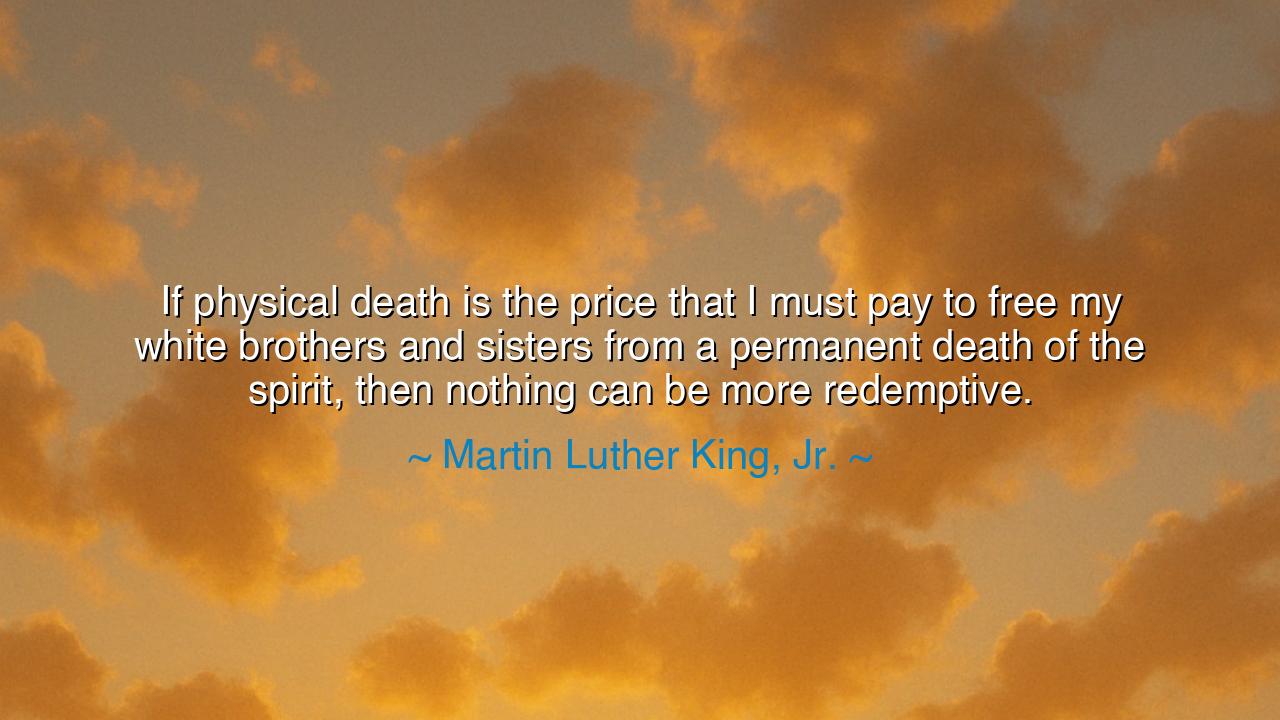
If physical death is the price that I must pay to free my white
If physical death is the price that I must pay to free my white brothers and sisters from a permanent death of the spirit, then nothing can be more redemptive.






When Martin Luther King, Jr. proclaimed, “If physical death is the price that I must pay to free my white brothers and sisters from a permanent death of the spirit, then nothing can be more redemptive,” he spoke with the voice of a prophet who had already looked into the face of death and did not turn away. His words are among the most sacrificial, courageous, and spiritually profound ever uttered in the struggle for justice. In them, Dr. King reveals that true freedom is not only a liberation of the oppressed but also of the oppressor—that the chains of hatred imprison both the wielder and the victim. To give one’s life so that others may be freed from their moral blindness, their death of the spirit, is, in King’s eyes, the highest act of redemption and love.
The origin of this quote can be traced to Dr. King’s meditations on nonviolence and Christian theology. Deeply influenced by the teachings of Jesus Christ, by Gandhi, and by his own experience as a Black man in segregated America, King saw that the sickness of racism was not merely political—it was spiritual. The oppressor was not only inflicting pain but also losing his own soul. To hate, to dehumanize, to dominate—these acts killed the spirit slowly and completely. Thus, when King said he was willing to die, he meant that his sacrifice was not only for the freedom of the Black community but for the redemption of America’s soul, for the awakening of those whose hearts had turned to stone.
In the ancient wisdom of the saints and sages, this is the path of the redeemer—the one who transforms evil not by retaliation but by self-offering. The physical death of the righteous, when accepted for a higher cause, becomes a seed of spiritual awakening for generations to come. Dr. King understood this law of life and spirit. He had seen the blood of innocent men and women flow through the streets of Montgomery, Birmingham, and Selma, and he knew that violence only begets more violence. But love—love that suffers, love that endures, love that forgives—has the power to resurrect nations. His death, he believed, would not be an end, but a beginning; not destruction, but transfiguration.
History, too, gives us the reflection of this truth. Think of Socrates, who drank the hemlock rather than betray his conscience. Think of Jesus, who bore the cross rather than take up the sword. Think of Mahatma Gandhi, who fell to an assassin’s bullet yet whose spirit awakened the conscience of a billion souls. Each of these men accepted physical death to bring others back from the death of the spirit—that moral numbness that blinds humanity to its own cruelty. Dr. King stood among them, knowing that he too might be struck down. But like them, he believed that death could never silence the voice of truth. He once said, “If a man hasn’t discovered something he will die for, he isn’t fit to live.” His willingness to die for love made his life immortal.
This death of the spirit, which King so vividly describes, is not confined to one race or one age. It is the death of compassion, the death of empathy, the death of conscience. It is the state of being alive in body yet dead in soul—a condition more tragic than the grave itself. The oppressor who hates has already lost his humanity, and the oppressed who succumbs to bitterness risks losing his light. King’s dream was to break this cycle by showing that love, even in the face of death, has the power to redeem the destroyer. His nonviolent resistance was not weakness, but moral fire—a flame that exposed injustice while illuminating the path to reconciliation.
When Dr. King spoke these words, he was not seeking martyrdom, but he understood it might come. His courage was born of faith: faith that his suffering would awaken conscience; faith that even his enemies could be saved from their hatred. His life was the living embodiment of the truth that to love those who despise you is not to surrender—it is to conquer evil without becoming it. His willingness to pay the price of death for the freedom of the human spirit revealed a strength far greater than that of any weapon or army. His love was not selective; it was cosmic, embracing friend and foe alike.
So, children of justice and seekers of peace, let this be your lesson: the greatest battle is not fought against flesh and blood, but against ignorance, hatred, and spiritual blindness. To fight these forces, you must carry both courage and compassion. Do not fear the loss of comfort or even of life itself, for a soul that lives in truth can never truly die. Remember that the measure of love is not how much it receives, but how much it gives, even unto sacrifice. When you see hatred rise in your time, answer not with rage, but with the fierce mercy that transforms. And if the price of love is suffering, let it be paid gladly—for in the end, as Dr. King taught the world, nothing can be more redemptive.






AAdministratorAdministrator
Welcome, honored guests. Please leave a comment, we will respond soon